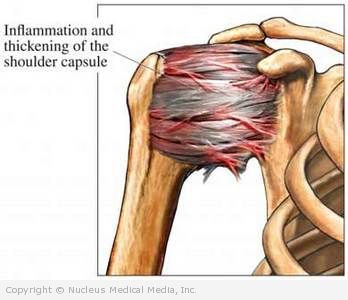Frozen shoulder
(Adhesive Capsulitis)
Frozen shoulder – Definition
Frozen shoulder is a tightening of the shoulder joint. It results in a loss of movement and pain at the shoulder joint.
In frozen shoulder:
- Active range of motion is lost — You cannot move your shoulder well.
- Passive range of motion is lost — Someone trying to move your arm at the shoulder joint will find it stiff and difficult to move.
This condition may get worse over time. After a period of time, the shoulder may also improve spontaneously. This improvement is called thawing.
Frozen shoulder – Causes
Frozen shoulder is caused by tightening of the soft tissues. This includes the capsule that surrounds the joint.
Frozen shoulder – Risk Factors
Factors that increase your risk for frozen shoulder include:
- Diabetes
- Thyroid problems
- Disc problems in your neck
- Injuries to the shoulder
- Illness or injury that forces you to keep the shoulder immobile for a period of time
- Heart and/or lung disease, during which time you do not move the shoulder normally
Frozen shoulder – Symptoms
Symptoms include:
- Painful shoulder
- Inability to move the arm at the shoulder joint, either by yourself or by someone else
Frozen shoulder – Diagnosis
The doctor will ask about your symptoms and medical history. A physical exam will be done. The doctor will test the range of motion in your shoulder.
Tests may include:
- X-rays
- MRI scan
- Arthrogram
Frozen shoulder – Treatment
Treatment focuses on:
- Relieving pain
- Restoring function and range of motion to the shoulder
Nonsurgical Options
Pain relievers (eg, ibuprofen and aspirin) — to help reduce inflammation and relieve pain
- Muscle relaxants — to help relax arm and shoulder muscles
- Physical therapy — to stretch muscles and restore motion and function to the shoulder. This is the foundation of treatment. It requires much home exercise
- Heat and ice therapies — to help relieve pain and reduce swelling
- Corticosteroid injections — as prescribed and given by your doctor (rarely done for this condition)
Surgery
Closed Manipulation
Closed manipulation surgery is a forceful movement of the arm at the shoulder joint. It is done to loosen the stiffness. This is performed under anesthesia. It is followed by intensive physical therapy. Be sure to follow your doctor’s instructions after surgery.
Arthroscopic Surgery
In arthroscopic surgery, a small incision is made in the shoulder. Special small instruments are inserted through the incision. The tightened tissues are released. The shoulder is manipulated. Physical therapy must be done after this surgery. Be sure to follow your doctor’s instructions after surgery.
Capsular Distension
Capsular distension is often done as a combination of an arthrogram and corticosteroid injection. The doctor expands the shoulder joint by injecting salt water under pressure. The fluid may contain cortisone and may also contain a dye that allows the shape and character of the shoulder joint to be seen.
If you are diagnosed with a frozen shoulder, follow your doctor’s instructions.
Frozen shoulder – Prevention
To help prevent frozen shoulder:
- Do regular strength training and range of motion exercises. This will help maintain a strong and flexible shoulder joint.
- Seek prompt treatment for a shoulder injury.
- Do activities that use your shoulder joint regularly.
- After any injury to the upper extremity (eg, hand, wrist, elbow), always move the shoulder through a full range of motion several times a day. This is true even when lying in bed for an illness such as a lung infection.

